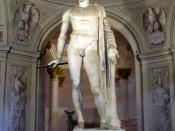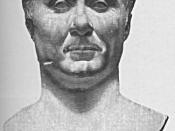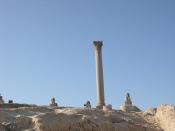Question: Account for Pompey's rise to political prominence between 78- 62 BC. You are to examine and analyse political machinations of Pompey and attempt to explain how he managed to fulfil his ambition. You must establish a clear understanding of the complexities of the political situation and the effects of the Civil War.
Gnaeus Pompeius Crassus, better known as Pompey, or Pompey the Great, was born on September the 20th, 106 BC. Pompey was a Roman general and statesman, the erstwhile ally of Julius Caesar, but later his arch rival for power. Pompey was born in Rome into a senatorial family, and established an impressive military record. He brought an end to the Servile War instigated by the slave Spartacus; cleared the Mediterranean Sea of pirates; conquered the kingdoms of Pontus, Armenia and Syria; and captured Jerusalem in 61 BC. He entered Rome in triumph, but encountered opposition from the Senate.
Pompey then formed an alliance, commonly called the First Triumvirate, with Julius Caesar and Marcus Licinius Crassus.
The career of Pompeius opened in fraud and violence. It was instigated, in war and peace, through illegality and treachery. Pompey was a great general, but a bad politician. Pompey helped to end the slave revolt of Spartacus in 72 BC. Because of his leadership abilities, Pompey was elected consul in 70 BC. However, he ran into opposition in the senate, especially from Marcus Crassus, and returned to leading the army to more conquests.
Pompey was an opportunist, he worked by himself, all the while leading the senate to think that he was working with them. He manipulated the senate to make out that Caesar was dangerous. Pompey became the most powerful man in Rome. During the time of his political prominence, the senate was very weak. Because of Pompeys popularity with the public and his military ability, along with his opportunism, he rose to this political prominence by his political machinations. The Civil War between Gnaeus Marius and Lucius Sulla was a major factor that effected his political situation.
Pompey was a young, confident man who had a habit to boast of the magnitude of his clientela, to advertise monarchs and nations bound to his personal allegiance. (Ad fam. 9, 9, 2: 'regum ac nationum clientelis quas oestentare crebro solebat). Pompey had from Thrance to the Causasus and down to Egypt acknowledging his predominance. The worship of power, paid homage to Pompey as a god, a saviour and a benefactor, devising before long a novel title, 'the warden of earth and sea'. (ILS 9459 (miletopolis)). Although Pompey was credited with vast military success, and hailed as Imperator several times, there is evidence to suggest that Pompey was not actually as skilled as he first appears. Pompey often avoided binding agreements, which could see him locked into losing a position. He frequently switched sides from the Optimates (in the senate), to the Populares (in the triumvirate) whenever he saw advantage. Therefore, Pompey was an opportunist.
Pompey's military commands were mostly not his own work, He usually was appointed towards the end of a campaign largely completed by other people. This shows the weakness of the senate. Pompey almost always received complete credit for the successful conclusion of the war. Indeed, it is likely that Pompey only entered into military engagements if it either provided him with political power or influence over people, which could translate into political power.
Pompey was insatiably covetous, which was a great cause of people's hatred for him. But many loved Pompey; his temperance, his skill and exercise in war, his eloquence of speech, integrity of mind, and affability in conversation and address. No men ever asked a favour of Pompey with less offence, or conferred one with a better grace. When he gave, it was without assumption, when received; it was dignity and honour. (Plutarch). Pompey was too much on the popular side, in that he had decided to restore the tribunician power.
The state of Italy in 78 BC was dangerous, the senate was confronted with a crisis. It's statesmanship and its competence to wield the powers put into its hands were submitted to a searching test, and this ordeal was the first of many. M. Aemilius Lepidus, one of the consuls of 78 BC delivered an attack which the government repelled. But the continuous pressure revealed the weakness of the senatorial position, and the citadel of the Sullan constitution had fallen. The breakdown of the Sullan system and the rise of Pompey then forced the senate back at every point.
Pompey's contracted ties of friendship with a number of great landowners of the class and rank of M. Terentius Varro from Reate in the Sabine land. (Varro served as a legate with Pompeius both in the Sertorian War and in the East, on sa and on land, cf. C. Cichorius, R. Studien, 189 ff). This helped contribute to his rise in power. The bulk of Pompeys personal adherents derived from Picenum- men of no great social distinction, the hungry sons of the poor and populous region. Picenum was the one sure hope of advancement. Pomey's consul was not effective, though a witty man and an orator as well as a soldier (Ib. I, 13, 2). He used political machinations; by scandalous bribery he secured the election of the military man L. Africanus.
Pompey tried to hold on to his connections to Republic families. Pompey divorced his wife, Mucia, who was Metellus' half sister, because of claims of adultery whilst he was in the East. After the divorce, Pompey hoped to retain links with the optimates by marrying Cato's niece. However Cato refused, calling it "a form of bribery"(Cicero, "Selected Political Speeches", p97.).
In conclusion, from appreciating Pompeys transcend to political exaltation between the years, 78- 62 BC, and from investigating and analysing the political conspiracies of Pompey. Also from adapting oneself to how he attained a point to achieve his position. I have demonstrated a unequivocal interpretation of the intricateness of the political authority and the consequences of the Civil War.





